Stellar Materials Introduces Thermbond 7200 Series Of Refractory Products
Stellar Materials LLC introduces the Thermbond 7200 Series of refractory products, which can reportedly reduce the cost of most furnace repairs by providing consistent properties with all common installation methods including casting, pumping, gunning, ramming and shotcreting, according to the company.
Conventional refractories used in the petrochemical, aluminum, steel, cement and power industries come in different formulations, each with specific properties when installed using a particular method. Often, when a furnace is taken down for maintenance, the installation method and materials needed for each repair changes, according to the company.
“In order to be certain that the repairs can be accomplished within the shutdown schedule, normal practice to is to order four or five different materials and have them all available,” says Tom Atkins, senior vice president- worldwide sales, Stellar Materials. “This approach ensures that the right material is on hand but the excess refractory ordered substantially complicates project management, material handling and storage requirements, and material return issues. This all adds to the cost of the repair.”
Thermbond 7200 Series products are mixed with water for casting or pumping, with 7200 Liquid for gunning or ramming or with 7200 Accelerator for shotcreting. Only two different liquids are required for all five major installation methods and the amount of liquid is roughly 5% by volume of the dry mix. Thermbond 7206 is a mullite based material; Thermbond 7206-N is the same basic formulation but is non-wetting to molten aluminum. Thermbond 7229 is a mullite based material with a 20% SiC addition. Thermbond 7229-N is the same formulation in a version that is non-wetting to molten aluminum. Additional bauxite-based formulations are currently under development and are expected to be released in early 2018.
Thermbond 7200 series products are fast firing products that enable shorter dry-outs. Depending on the installation configuration, thickness, lining condition and geometry, the product can be fired in at up to 200 degrees C per hour with no holds.
